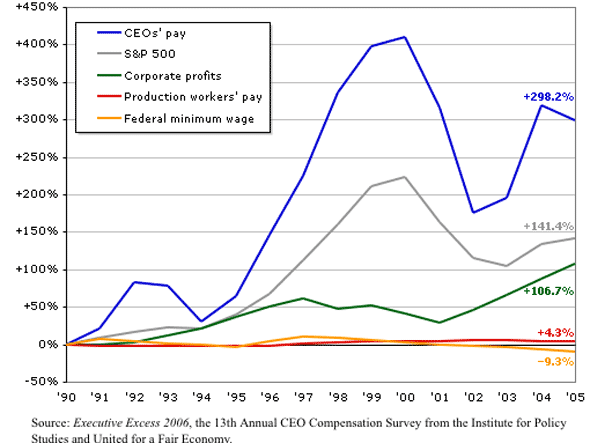1). Rein in the financial sector.
... break up the giant financial monopolies and install a regime that seriously addresses the continuing epidemic of reckless speculation.
2). Increase the Minimum Wage.
Over the past 40 years, the real value of the minimum wage has fallen sharply. If Congress had linked the minimum wage to inflation, it would currently be $10.74 per hour instead of $7.25
3). Trade agreements must put as much emphasis on worker rights as property rights.
The globalization of the world economy is inevitable. But the race to the bottom to cut wages and benefits is not. No other first-world nation has been so reckless with the well-being of its workers in its trade negotiations as has the United States.
One reason corporations push for pacts that open trade is to move their production overseas and employ foreign workers at sweat shop wages. Fair trade requires that agreements demand the same protections for the rights and remuneration of workers in other countries that we should be providing in the United States.
Otherwise - particularly while we allow corporations to systematically undercut the power of unions - there is nothing to stop wages from continuing to fall since there is a virtually unlimited number of workers in the developing word that are willing to work very, very cheap.
4). Change the labor laws to make it easy to exercise worker rights to collective bargaining.
... The decline of union membership is no accident. It is the product of a massive, long-term campaign to limit the rights of workers to organize unions and collectively bargain over wages and benefits.
The Wagoner Act gave all employees the right to organize unions and bargain collectively. But over the last thirty years those rights have been systematically eroded by corporate abuses that can only be addressed by major labor law reform.
... Without unions to demand their share of growing productivity, corporations and the financial sector will continue to siphon it all off for themselves. We don't have to speculate about whether they will do it. They have done it for over 30 years. Now if we are serious about dealing with the crisis of economic inequality we have to act to restore the right of collective bargaining.
5). Refuse all efforts to cut benefits that have been earned by everyday Americans --and raise the cap on Social Security taxes paid by the wealthy.
We must stop cold attempts by the Right to eliminate Medicare, slash food stamps, and cut Social Security benefits. If we don't, those cuts will simply increase economic inequality since they come right out of the hides of ordinary middle class families.
... We live in a country that is richer than ever - by a lot -- yet the Right claims we "no longer can afford" Medicare or current levels of Social Security benefits - or food for children - or funding for education? That's just hogwash.
And to make certain that Social Security is there for generations, we must raise the cap income covered by the Social Security (or FICA) payroll tax.
Right now individuals don't pay the FICA taxes that finance Social Security on income above $113,700. But the average income of the top 1% is $717,000, so $603,300 - or 84% of the income of the highest income Americas is exempt from paying Social Security taxes. The idea of progressive taxation is that those who can most afford it - who have benefited the most by our shared economic activity - should pay the most. Here just the opposite is true. That's absurd.
6). Make certain the Affordable Care Act (ACA) functions as it was intended.
... The law's most important provision may be the expansion of Medicaid for the working poor. Before its passage, many people in low wage jobs were not covered by employer based insurance, unable to afford private insurance, and could not quality for Medicaid. Now, if employers don't provide insurance for low wage workers, they can either qualify for Medicaid or for substantial subsidies toward private coverage.
7). Create a new tax rate for income above $1 million - close tax loopholes that benefit the wealthy and big corporations - and increase the maximum estate tax rate.
... The super rich - who have benefited so incredibly from the American economy - must be taxed at a level that is reflective of their qualitatively different income status.
The top tax rate went up to 39.6% as a result of the fiscal cliff deal earlier this year. That's a big improvement over the 35% rate that resulted from the Bush tax cuts. But that is a far cry from the 92% top tax rate in effect during the early Eisenhower years - or the 77% top rate that pertained during the Nixon Presidency - or the 70% rate under Gerald Ford.
Under the fiscal cliff deal, the estate tax imposes a levy of 40% on inheritances of over $5.2 million. That is a long way from the 77% top rate that applied from 1916 to 1975. One critical way to decrease long-term economic inequality is to increase the taxes paid on the inheritances by the sons and daughters of multi-millionaires who did nothing to earn these fortunes except benefit by the accident of birth.
And how smart do you have to be to know it's a bad idea to give big tax incentives to companies who outsource jobs from the United States.

